Sat, 27 February 2021
Direct download: OFI_1006__Is_It_A_Crime_Or_Is_The_Divide_Between_Urban_And_Rural_That_Big____Rural_Crime_Edition.mp3
Category:general -- posted at: 12:30am MDT |
Fri, 26 February 2021
SHOW NOTESIf you have been listening to the Off-Farm Income Podcast for a while then you have heard a lot of stories about agricultural entrepreneurship, you have heard a lot of stories about FFA students and you have heard a lot of stories about where those two paths intersect. Today, we are very lucky to be able to give you the "after picture". We are able to bring things full circle and show you how it all comes back around. Our guest today is Caleb Green, and he has a great story. Caleb grew up in northern Wyoming around farmers and farming with his dad. Caleb was also an FFA member, and when it came time to select a supervised agricultural experience he decided to start a custom hay business. He named it "Evergreen Custom Haying". When Caleb chose to start this business he looked around at what was offered in his community, and he found a niche haying on smaller properties and putting up small, square bales for horse owners and people who needed them. Soon, he was growing his business, expanding his customer base, and purchasing more equipment. Caleb's services even included irrigating for his customers when that was necessary. After graduation, Caleb went on to college and started studying ag. All through this time, he kept his haying business going. But, like so many FFA students, Caleb had been inspired by his ag teachers and he was focused on getting his degree and returning to the ag classroom, this time as an FFA advisor. Caleb is now 25 years old, and that "return to the classroom" moment came in July of 2020 when he was hired as the ag teacher at Burns High School, near Cheyenne. He started on July 1, going out and meeting his students at their homes while checking in on their projects. Soon, it was time for the county fair, followed immediately by the state fair and then right into the first day of school. The writing is definitely on the wall for Evergreen Custom Haying, looking back on this summer schedule. Caleb's FFA chapter needs him at the exact same time that most of the haying in his part of Wyoming gets done. Caleb has tinges of emotion when he thinks about not running his custom haying business any longer. He misses being out there in the open, cutting hay, and doing things on his own terms. However, his excitement about being in the classroom is contagious. Because of the requirement for supervised agricultural experience, Caleb started a business and learned about entrepreneurship. Today, Caleb is the person at the head of the agricultural classroom, and he has the opportunity to take what he learned by running his own business and teach it to dozens of students. And, as the years go by that number will turn into hundreds and eventually thousands. Entrepreneurship is desperately needed in our rural communities for a number of reasons, and that is why I am so eager to profile entrepreneurship in the FFA. Ten years ago Caleb got introduced to the concept by his then FFA advisor. Today, he is introducing multitudes to the concept with the benefit of his experience. Coming full circle, Caleb is giving students the inspiration, permission, and knowledge to be able to work in agriculture, create jobs in rural communities and avoid being forced to move to the city for work. This is an FFA success story at its finest!
Connect with Caleb Green & Evergreen Custom Hayingat: Facebook: facebook.com/EvergreenCustomHay
Direct download: OFI_1005__Coming_Full_Circle_From_Ag_Student_To_Ag_Entrepreneur_To_Ag_Teacher___Caleb_Green___Evergreen_Custom_Haying.mp3
Category:farming -- posted at: 12:30am MDT |
Thu, 25 February 2021
KEY IDEAS: "The #1 reason that farms fail is that they fail to profit". This statement by Ted Lebow seems simple and obvious, but when you dig deeper it is actually complex and difficult to understand. Ted's company, Kitchen Table Consultants, looks at farming operations, especially those actively involved in marketing their produce, meat, and fruit, and see how business models can be a detriment to the success of the farm. Ted grew up in agriculture in Nampa, Idaho. He participated in the FFA and later studied agriculture at Cornell University. He has also started several companies, including Kitchen Table Consultants. He has seen how failing to properly assess profit can lead to not just the loss of a farm, but the loss of a lifestyle. In this episode, Ted gives several tips to farmers on how to maximize profitability and sustainability. One interesting point that he made was that farming operations that are involved in marketing should act as two different farming entities. One entity is involved in farming and the other is involved in marketing. This will help the farm to determine if they are profitable, and if not it will tell them in which aspect of their business they are failing to profit.
This episode is a bit different from normal as I was not interviewing Ted about forming his businesses. I was asking him about what he teaches and consults on to help farmers succeed. I know there will be something in here that can help you with your future success. CONTACT Ted Lebow & Kitchen Table Consultants: Website: kitchentableconsultants.com Facebook: facebook.com/kitchentableconsultants Instagram: instagram.com/kitchentableconsultants
Direct download: OFI_1004__How_To_Make_Farms_Profitable___Replay_with_Ted_Lebow___Kitchen_Table_Consultants.mp3
Category:farming -- posted at: 12:30am MDT |
Wed, 24 February 2021
INTRODUCING WILLIAM PAXTON: About 90% of the time when I interview an FFA student on this show they are junior or senior in high school or are already in high school. Occasionally I get to speak with a student who is just starting their high school career and their journey in the FFA. That is the case in today's interview with William Paxton. William is a freshman at Stuart Public School in Stuart, Nebraska. Even though he is just beginning high school he has already been learning about beekeeping and developing his own bee business, Paxton 5 Beehive, for just over four years. Starting during his years in 4H, William started raising bees. He has had multiple hives die over the winter, and he has replaced them multiple times. He has persisted through all of this, learning more and more about raising bees. This past summer he had his first successful honey harvest. As an incoming freshman William had already gone through the difficult part of learning his trade. He had failed many times, corrected his mistakes, and pushed forward. Then, when it was time to begin his supervised agricultural experience he was at the stage of development that he was able to sell a product. This is a head start. What is amazing about this head start that William had is that when he finally did have a successful honey harvest he already had customers on a waiting list that wanted to purchase his honey. And, this was the first time he had ever had honey to sell! So, how did he do this? William attributes this to the agricultural education that he received going through the 4H. Specifically, the requirements for public speaking that came with being a 4H member. Through the 4H William participated in multiple public speaking events, and he always chose to speak about bees and his goals in raising them. Inadvertently, this became a marketing campaign for his honey and people lined up to purchase from him. All he had left to do was actually produce the product.
The head start that William received through the 4H is just the start. Obviously, this was a great head start for him upon entering the FFA. An incoming freshman starting their first SAE in the FFA is not expected to have an up and running business already. So, the 4H provided William a head start on the FFA. Now, William has four years to develop his business through his SAE while he continues with public speaking through the FFA. This is another head start for him, a head-start on life. How many high school students do you know that will have been running a completely vertically integrated business with a waiting list of customers for 8 years at the time of high school graduation? I would venture a guess that you probably don't know any unless they are involved in agricultural education.
Direct download: OFI_1003__The_Agricultural__Head_Start____FFA_SAE_Edition___William_Paxton___Stuart_High_School_FFA.mp3
Category:FFA -- posted at: 12:30am MDT |
Tue, 23 February 2021
Direct download: OFI_1002__To_Move_To_Montana_In_Winter.mp3
Category:general -- posted at: 12:30am MDT |
Mon, 22 February 2021
INTRODUCING LANEY JONES: Today's guest, Laney Jones, and I have a few things in common. First, we are both fans of the Montana State Bobcats! Second, we enjoy raising cattle. And third, we direct market our beef to customers who are willing to pay a premium to purchase beef directly from the producer. And, like me and every other beef producer who direct markets, Laney encountered an issue with the quantity, or lack of quantity, that some customers wanted to purchase. To explain where I am coming from, butchers break beeves down into 1/2's, and they butcher half of the beef at a time. That means that if a customer purchases either a whole or half beef they can tell the butcher exactly how they want it cut up because the butcher is able to apply their instructions to each half they are buying and make it how they like it. When a customer asks to purchase just a 1/4 of beef, that means that they are purchasing a 1/2 of a 1/2. When this happens, a producer like myself has to pair up the customer purchase 1/4 beef with another 1/4 beef, and those two customers have to agree on how the meat will be cut up. Because they are splitting a half, all the cuts from that half will be done exactly the same way, so they have to come agreement on things like the thickness of steaks ahead of time. This can be a real hassle for the producer and the butcher when it is time to cut the meat up and divvy it out. Laney lives in Montana, which is a really traditional beef-producing state. So, this is a problem that direct marketers have basically just accepted as something that will always be there, because what else can be done? But Laney was different. She saw this problem, even having customers that wanted to purchase quantities as small as 1/8 of beef, and she set out to solve it. That is when Laney stumbled upon Miniature Angus Cattle. Laney purchased some "mini's" to put her idea to the test, and she direct marketed them through her uncle in Bozeman. When it came time to butcher the steers she found that their finished live weights were just above the hanging weight of a traditional steer. This meant that her customers who used to want a 1/4 beef could now purchase a full 1/2 of one of her steers. This took all the complications out of the butchering process.
The prospect of raising and direct marketing beef has really helped Laney discover a passion for entrepreneurship. She has steadily grown her operation, and this year she is direct marketing 19 head (3 in May and 16 in the fall). She told me that she plans on going to college when she finishes high school, but she is going to be looking for a way to come home and continue with her direct marketed beef operation. If she can find a way to do this for her full-time living, that is exactly what she wants to do.
Direct download: OFI_1001__Solving_An_Unsolvable_Problem___FFA_SAE_Edition___Laney_Jones___Custer_County_District_High_School_FFA.mp3
Category:FFA -- posted at: 12:30am MDT |
Sun, 21 February 2021
I originally had Jonathan Russo on Episode #334 of the Off-Farm Income Podcast in 2017. At that time he had just finished high school and was preparing to study agriculture at the University Of Connecticut. So, where is Jonathan now? And, what has he been up to? In today's episode, we get to catch up with Jonathan and find out all the amazing things he has been doing for the past four years. I'll give you a hint - he is about to move into graduate school, he is releasing a documentary soon and he is just about to publish a research paper. Oh, and he is still consulting about aquaponics. In short, Jonathan is on fire! We will get all the details from him in this bonus episode of the Off-Farm Income Podcast. Below are the show notes from our first interview with Jonathan. INTRODUCING JONATHAN RUSSO!Have you ever wondered how you become a consultant? How about how long does it take to become one? Our guest today just graduated high school and is getting ready to start college. Over the last four years, he explored an interest he had in hydroponics. He started out doing a research SAE, finding out how it works. Then he started growing food for himself with his own system. Soon he was selling equipment to other people who wanted to do the same. Over the four years, Jonathan grew his reputation and started installing systems and repairing systems for people in his area. As he became a more recognized expert people started to call him for consultation on how to build their own system and make it work. That is how you become a consultant in just four years! That is how he started Fairfield County Hydroponics. Jonathan hopes to expand his business beyond his county, to his whole state. Then all the way across the country. Those plans are on temporary hold as he starts college. But he is going to start developing that national reputation from his dorm room by writing all about hydroponics. This is a great story! |
Sat, 20 February 2021
Direct download: OFI_1000__Thousands_Of_Memories_And_Thousands_More_To_Come.mp3
Category:general -- posted at: 12:30am MDT |
Fri, 19 February 2021
SHOW NOTESI love it when ideas spring from actual life experience and people have the courage and tenacity to follow through on making those ideas a reality. That is absolutely the case on today's episode, featuring the founder and creator of Ag Butler, Kevin Johansen. Kevin and his wife, Jamie, raise cattle in Lebanon, Missouri. They both grew up ranching cattle in the "Show Me State", and they continue this way of life as a couple. You may recognize Jamie's name, as she was the featured guest on episode #772 of the show when we profiled her business, Honey Creek Media, almost exactly one year ago today. Kevin has always been involved in entrepreneurial ventures. One of those was working as a freelancer, clipping cattle for people in preparation for shows and sales. During his time doing this work, he noticed how antiquated and awkward the process was for finding help. Kevin's particular skill is just one of the many different skill areas that farmers and ranchers need help with at certain times of the year. And Kevin noticed that when people discovered that their workload rose to the level of needing additional help for a certain project or time of the year, that finding the correct people was ominous. Kevin described how farmers and ranchers might have a name stored in a phone or on a piece of paper somewhere. If they could find that name and give them a call the number might not be good any longer, the person may no longer be freelancing or they might have already agreed to work for somebody else because everyone tends to have the same needs at the same time when it comes to clipping and fitting for livestock shows. For the farmer or rancher who needs help, this creates a real problem. Their entire network of freelancers that could help them was limited to who they had used before. If these people were unavailable they would have to start over from scratch on finding someone. This would be done by calling around and asking for referrals. And, these referrals might have first-hand knowledge of the person's skills and reliability, but possibly not. So, it was a gamble as to whether or not this person was going to work out well for the farmer's needs. Kevin decided to try and figure out a way to solve this problem. After giving it deep thought, he came up with the idea of Ag Butler. Ag Butler is both an app and a website that a farmer and a freelance laborer can sign up for. With the information that they input, the right two people can get matched up. Also, the farmers and ranchers that hire these individuals can rate them, so that farmers and ranchers in the future have less of a gamble when hiring. There are real-world testimonials on the app to help farmers and ranchers determine who is correct for them. Kevin launched Ag Butler in August of 2020, and it has been working well. They have steadily had more and more people signing up for the service and it is already helping farmers and ranchers who need extra help as well as freelancers looking to work in agriculture. I believe that there is a significant difference in the quality of a service or product that is determined by the experiences of the founder or those people brought in to help develop it as compared to somebody with an idea who has never worked in the field. Kevin has seen this problem from both sides, and that has made him uniquely qualified to create this product and solve this problem. And, I think he has done it! Connect with Ag Butler, and Kevin Johansen at: Website: agbutlerapp.org Facebook: facebook.com/AgButlerApp Instagram: @agbutlerapp Twitter: @AgButlerApp Email: support@agbutlerapp.org
Direct download: OFI_999__An_Agricultural_Match_Maker_Connecting_Farmers__Ranchers_With_High_Quality_Labor___Kevin_Johansen___Ag_Butler.mp3
Category:farming -- posted at: 12:30am MDT |
Thu, 18 February 2021
Our guest today is more proof of an emerging trend in production agriculture. Young farmers are recognizing both the need for off-farm income and that entrepreneurship is the best way for them to produce this. Mark Hewitt and his wife have their own small farm and are leasing more ground to build their lives in agriculture. However, they are not to the point that they are self-sufficient yet. So, Mark needs to bring in money from off of the farm. He has chosen entrepreneurship to do this because it allows him flexibility in his schedule to manage his own farm as effectively as possible. Also, it offers an opportunity for greater earning potential than a job, which could speed up his pathway to full-time farming. Last, but certainly not least, it allows Mark to arrange his schedule to maximize time with his family. If you want to be a full-time farmer in production agriculture, this is a great episode for you to listen to. It also is more proof of this emerging trend among young, production agriculture farmers. ADVICE FROM MARK: RESERVES: Mark definitely suggests prioritizing having some capital reserves. You never know when an issue will come up in which you need money to run your business or an opportunity will arise that you can only take advantage of if you have the money. PERSONAL HABIT THAT MAKES MARK SUCCESSFUL: CONVERSATION: Mark describes himself as a conversationalist. He loves to talk about farming, and he went with his strength when it came to choosing a business. Now he gets to talk farming and turn that into supplemental income. BEST BUSINESS ADVICE EVER GIVEN TO MARK: "Don't Get Discouraged By The Word 'No'". If you are going to work in any type of sales you will have to get used to hearing this. And, you will have to keep trying until you hear "yes". CONTACT INFORMATION AND LINKS: Mark's Email Address: mark@hewittprecisioninsights.com Hewitt Precision Insights Website: LINK Facebook: Hewitt Precision Insights | Facebook Twitter: Hewitt Precision (@hewittprecision) / Twitter Instagram: Hewitt Precision Insights (@hewittprecision) • Instagram photos and videos
Direct download: OFI_998__How_To_Build_A_Sustainable_Family_Farm_Business___Replay_with_Mark_Hewitt___Hewitt_Precision_Insight.mp3
Category:farming -- posted at: 12:30am MDT |
Wed, 17 February 2021
INTRODUCING Whitney Ten Napel: When I was first starting my agricultural journey in college I was taking animal science classes at the Modesto Junior College in Modesto, California. My last semester there I took a dairy science class, and I can remember the instructor named Hal Carlton talking to us about career options. He kept talking to the class about the dairy industry, which meant working in the factory side of the dairy business in creameries and the like. There were a lot of jobs available, and good employees were really needed. A lot of water has passed under the bridge since I took that class, and since I have seen Hal. Today's interview brought that all back to me. I am interviewing Whitney Ten Napel on this episode. She is currently a junior at South Dakota State University in Brookings, South Dakota. She is majoring in dairy manufacturing, which she explains to me is the same thing as what Hal described as the dairy industry. Whitney is able to articulate her choice of major and future career very well. She knows why she loves agriculture, and why she wants to work on the industrial side of things. Also, Whitney has really been exploring her options when it comes to her chosen career. She has already completed two internships, working in plants and processing both milk and cheese. And, she is going to complete another internship this summer, doing it all again.
You are going to love this interview with Whitney Ten Napel!
Direct download: OFI_997__Exploring_The_Industry_Of_Agriculture___FFA_SAE_Edition___Whitney_Ten_Napel___Le_Mars_Community_High_School.mp3
Category:FFA -- posted at: 12:30am MDT |
Tue, 16 February 2021
Direct download: OFI_996__What_Do_You_Do_In_The_Winter_.mp3
Category:general -- posted at: 12:30am MDT |
Mon, 15 February 2021
NTRODUCING KENZIE BROWN:
Over the past six years, I have interviewed a lot of incredible guests on this show, and I have talked about a lot of different business concepts. One of the things that I learned when I became an entrepreneur and one of the things I try to convince people of is how you see things differently once you start your first business. There is a real keyword in the final sentence of that first paragraph, and that is "start". So many people get caught in the loop of dreaming, researching, and then back to dreaming when it comes to their first business. They have a vision, but they don't know how to make it come true. They want to work for themselves, but they don't know what type of business to start. Our guest today is a freshman in high school, but she has a lesson for all aspiring entrepreneurs, and that is to start. Kenzie just started high school in September, but she was lucky enough to have a mom who had been an FFA advisor and could tell her some of the things she was going to be doing in high school. So, instead of waiting for when her ag teacher assigned her to develop an SAE, she just started one. Kenzie saw something on Pinterest that she thought would work as a side business, making dog treats. So, she started researching and then starting making the treats and experimenting with her own dog back in September. By Christmas, she already had a business name, Pepper's Pup Treats. And, she had orders for 100 dozen dog treats! Now, Kenzie is looking into the future and the next 3.5 years of being an FFA member, and she sees a growing business with an expanding array of products. This is all happening so fast for Kenzie because she started. She did not sit around and wait for the perfect moment or to be told by her advisor that it was time. She just jumped right in. This has done two things. First, she is up and rolling and her business development is way ahead of most students, even FFA students, at this stage of high school. Second, she has been exposed to a very legitimate way of making a living. She will never again wonder if she can operate her own business. Now, she will see the world through the lens of an entrepreneur. The world looks differently this way because you see business opportunities and ways to serve other people around every corner. If you have a dream of a different lifestyle or of self-employment, I want you to follow Kenzie's example. I don't care if you start the same exact business. It doesn't have to be anything huge or take a lot of money. Just start creating a product or offering a service and try to make money from the idea. Just like what Kenzie and I both experience, you will start to see opportunities that you did not know were there, and you will find energy reserves that you did not think were possible! Follow Peppers Pup Treats Here: Facebook: https://www.facebook.com/pepperspuptreats Instagram: Pepper’s Pup Treats (@pepperspuptreats)
Direct download: OFI_995__What_You_Can_Learn_About_Business_From_A_High_School_Freshman___FFA_SAE_Edition___Kenzie_Brown___Mound_City_R-2_High_School_FFA.mp3
Category:FFA -- posted at: 12:30am MDT |
Sat, 13 February 2021
Direct download: OFI_994__Better_Protect_Your_Catalytic_Convertors___Rural_Crime_Edition.mp3
Category:general -- posted at: 12:30am MDT |
Fri, 12 February 2021
I don't know if you have noticed, but his show is about non-conformists and people who look at the world a different way. All of us fit that definition a little bit by the mere fact that we want to farm and only 2% of our population is in that career field. But what about that person that says "why do I have to do it that way"? Today's guest, Ben Rykerd, is that person. Ben is now 29 years old. He describes himself as having a "travel bug" and he has known this since he was a kid. So, as high school was coming to a close Ben didn't just take the next prescribed step in the journey, he stopped and asked himself what type of life he wanted to have. Ben also didn't look at things through the lens of an "either/or" mentality. He looked at "and" solutions. He knew that he wanted to travel, and he knew that he both had to and wanted to work. But, he never made the statement "I want to travel, but I can't because I have to work". Ben found a way to say "I want to travel, and I can because of my work". Ben first looked into being a truck driver, because that would get him out on the road and allow him to see the U.S. However, he was not going to be eligible for a license that would allow him to drive outside of his home state until he was 21. So, he started looking at alternatives. What he ended up finding was working on a custom harvesting crew. He found an operation in Kansas that was hiring, and he knew that working there would take him all throughout the Grain Belt and allow him to see a lot of the United States. After one email, he was hired! That crew, which Ben worked with for four years, was the opening of an exciting adventure. On this crew, he had coworkers from Australia and New Zealand, and they told him all about the farm work available to him down there. Before he knew it, he was working on a dairy in New Zealand, learning something totally new about agriculture. Soon, he found himself in the vast interior of Australia on a custom harvest crew. He has also worked in Canada and continues to work in the U.S., now on a custom farming crew. Ben has his eyes set on Ireland, Finland, and Germany as well.
In this episode, Ben talks about how he got started, the Visa he obtained to do this, how to extend your time in Australia, how much money you need to get yourself started, and much more! Connect with Ben Rykard at: Instagram: @Dirtbag_Ag Email: BenRykard@gmail.com
Direct download: OFI_993__How_To_Travel_Internationally_Through_Farming___Ben_Rykerd___World_Traveler_And_Farmer.mp3
Category:farming -- posted at: 12:30am MDT |
Thu, 11 February 2021
INTRODUCING BAILEY MORRELL!I love it when students in the FFA with their own businesses discover niches and turn them into businesses. Our guest today, Bailey Morrell, did just that with farming. She has been raising Hereford cattle for several years now and growing her herd. Recently Bailey had an opportunity to do some dryland farming on some neighboring property. Because it was going to be dry land, she had to figure out something that could work. She realized that she could grow oats under those conditions but wanted to figure a way to make that as profitable as possible. She decided to turn the operation into a certified organic opera Bailey shares equipment with her parents and really has an eye for agribusiness. This led her to become the new California State Star Farmer.
Direct download: OFI_992__Hereford_Cattle__Organic_Oat_Hay__California_State_Star_Farmer____Replay_with_Bailey_Morrell___FFA_SAE_Edition.mp3
Category:FFA -- posted at: 12:30am MDT |
Wed, 10 February 2021
INTRODUCING COLE TAYLOR: You can't get more remote in the lower 48 states than the far, northeast corner of Montana or the northwest corner of North Dakota. The towns are small, the winters are extreme and the people are fantastic! Our guest today, Cole Taylor, comes from one of those such towns - Opheim, Montana. He is the president of this FFA Chapter, and he is taking full advantage of state and national SAE grants to start and grow his bee and honey business, Cole's Honeybees and Blue Sky Honey. Opheim High School and Junior High School are combined and together they have a total of 15 students. That is small! Cole was not born in raised in Opheim. His father is originally from that area but spent a career in the military. It was only after his father retired, and when Cole was in the 6th grade, that Cole and his family moved to Opheim. Even though Cole was not coming from a large city or particularly a large high school, he still downsized in both town and school in a big way. In today's episode, Cole and I will discuss what it was like to make that move and to learn the new social norms of such a small town. We will also discuss how he got the idea to start a bee business, and how he has been able to fund the startup through SAE grants. Cole has awesome goals for after high school that involve service and duty. He will explain where he is headed. You are going to be an even bigger fan of small-town America and the great citizens they produce after this interview!
Direct download: OFI_991__We_Are_Moving_Where____FFA_SAE_Edition___Cole_Taylor___Opheim_High_School_FFA.mp3
Category:FFA -- posted at: 12:30am MDT |
Tue, 9 February 2021
Direct download: OFI_990__You_Better_Learn_To_Hear_Whats_Coming.mp3
Category:general -- posted at: 12:30am MDT |
Mon, 8 February 2021
INTRODUCING CONNIE ROGERS I am an agricultural advocate, and most of the students that I interview on this show are as well. And, what are we doing as advocates but providing information to people about our industry so that they can make a well-informed buying decision? Considering the amounts of misinformation about agriculture that exist, I think it is all of our responsibility to participate as advocates in one way or another. Our guest today, Connie Rogers, takes this to a whole new level. Connie and her father raise and farrow about 200 sows in Southern Georgia. Connie is intimately familiar with this business and has been showing pigs since she was in the 2nd grade. When it came time to choose a supervised agricultural experience for the FFA, raising and showing pigs was a natural fit. However, Connie recognized that there was more going on than just feeding, showing, and marketing pigs. She realized that there were people who were afraid to consume pork because they had been told that pigs were fed high levels of antibiotics, and if they were to consume pork from these pigs they would be consuming bacteria that were resistant to antibiotics. Therefore, if that same bacteria took root in their own body, it would not respond to the medicines that were available. Connie saw it as a natural fit to add an agriscience research SAE to her workload to study this claim. She decided to feed two separate batches of pigs - one with antibiotics and one without - and then measure the results. She wanted to use her finding to provide accurate information to would-be pork consumers. Connie's efforts in this project have earned her both state and national recognition. It has also propelled her into college where she is studying agricultural education. A lot of us are willing to talk about agriculture and the facts of our industry. Connie went to the length of researching to get the first-hand information that she would share. That is advocacy!
Direct download: OFI_989__Revolutionizing_The_Concept_Of_Agricultural_Advocacy___FFA_SAE_Edition___Connie_Rogers___Lowndes_High_School_FFA.mp3
Category:FFA -- posted at: 12:30am MDT |
Sat, 6 February 2021
Direct download: OFI_988__Putting_A_Stop_To_Stock_Theft___Rural_Crime_Edition___David_Smith___Ceres_Tag.mp3
Category:general -- posted at: 12:30am MDT |
Fri, 5 February 2021
SHOW NOTESAbout two months ago I looked down at my phone and saw that there was a voice mail from my father in law on there. I listened to the message, and to his attempt to live in my world of technology, even though that was so foreign to him. He told me that he had just read an article about a guy from Florida that was "making a website" like me and that I should listen. He said that the show was about cattle ranching in Florida and that he had never realized that the first cattle in America were brought to Florida in 1521. He said that the show was named "Between The Beaches". I've got a small, Bluetooth speaker made by JBL called the JBL Clip that I use twice per day. In the mornings and evenings when I am doing chores I listen to podcasts on it. I clip it onto the gear shift of my Polaris Ranger, and while I am driving around the farm feeding cows and goats I can learn something. So, the night that I received this voice mail I decided to give "Between The Beaches" a try. I have been hooked on this show ever since. I like to learn, but there is so much information out there that I will never be able to take it all in or even decide what to take in, in a lifetime. Without "Between The Beaches" I would never have known or even tried to learn the cattle ranching history of Florida. There is a lot of fascinating information in this show that has kept me coming back for another episode. The host, Brad Phares, is our guest on today's show. Brad has constructed a very unique podcast in that he does two things very well. First, he educates people on the history of cattle ranching in Florida. There is 500 years' worth of it after all. Second, he talks about why cattle ranching is so important to the State Of Florida in modern times. With 1,000 people moving to Florida every day, he makes a strong case for why cattle ranching is essential. I am thrilled to bring Brad on as a guest today, and I hope you will all put him on your playlist. You will really enjoy getting to know all about cattle ranching in Florida! Follow Brad & Cow Hunters Unlimited Here: Website: http://www.cowhuntersunlimited.com/ Facebook: https://www.facebook.com/CowhuntersUnlimited Twitter: https://twitter.com/WBPhares Instagram: https://www.instagram.com/cowhunters.unlimited/ Between The Beaches Podcast: http://www.cowhuntersunlimited.com/between-the-beaches-podcast
Direct download: OFI_987__Fighting_For_The_Way_Of_Life_You_Love___Brad_Phares___Between_The_Beaches_Podcast_And_Cow_Hunters_Unlimited.mp3
Category:farming -- posted at: 12:30am MDT |
Thu, 4 February 2021
SHOW NOTESThe Current Stage Of My Life And Business Well, here we are, just a week away from Thanksgiving with 2019 bearing down on us soon. What are your goals for the upcoming year? What stage of business development or production will you be in during 2019? Perhaps you are just starting your plan to become an entrepreneur. Or maybe you have started your business and are growing it while you continue to work at your full-time, "day job". Maybe you have even made the transition to full-time entrepreneurship and are looking for other revenue streams or are developing your farming operation. I have been through all of these stages. I want to share the stage I find myself in now. This is probably the most difficult stage to share with you. It is not because something bad has happened or because I am ashamed of where I am at. I think it has to do with my raising. Talking about this stage feels a bit like bragging. And certainly, nobody in my family has ever done anything like what I now do for a living. So, for me to talk about this stage I have to remind myself what this podcast is all about. My purpose here is to be a cheerleader for you, to be the person who keeps moving forward on this path so you can follow behind, and to be the person who takes the risks and leaps of faith to show you that it is possible. And of course, in the worst-case scenario to be the person who fails and warns you ahead of time so you don't make the same mistake that I already have. My purpose is also to be an inspiration. I know how much the people I listened to, read, and watched inspired me when I was first beginning my journey. I remember hearing about how they lived their lives, and wondering if it could ever be possible for me to live that life someday. Now I find myself doing that, and I have to force myself to think back to when I wondered if it would ever be possible so I can see the transition that has taken place. So, the stage I am entering into now is the one that I dreamed about way back in 2009 when I first really started thinking about what I wanted my life to look like. For those of you who have been listening for some time, you know that having a podcast was not part of that vision back then. The podcast is one of the pivots I made along the way. In 2009 I just had a seed of an idea. I had a vision of a better way for me to live my life. That little seed opened a pandora's box for me. I had no idea how to get to that place, but I knew I wanted to be there. This is what my life looks like today:
I have systems in place for all of these revenue sources which makes them very easy to manage and maintain. What this means for my lifestyle is that it is extremely flexible, stress-free, and less demanding than anything else I have ever done. Except for the farm, I do not have a significant hourly commitment each week to keep up with those streams of revenue. I call agriculture "the ultimate lifestyle business" and I prove it every year. By far, the farm provides me the lowest hourly wage of any of these streams of revenue. However, I am able to be on my farm 100% of the time now, and being able to do that is the reason all the other streams of revenue exist. When I look into the future, and I see the potential for growth in these revenue streams I am filled with optimism. In the area that we live, real estate values and rent prices are appreciating rapidly, which has a direct impact on the value we receive from our two rental houses. We continue to grow this show, and as a result, offer more value to our advertisers making that more and more valuable. We had a great reception for the online course at the National FFA Convention this year, and the possibilities there are endless. Production of the Bulkloads Podcast is going very well, and there is room to add more production clients. D&B Supply is doing great, and the radio show I am hosting for them is working just like I had imagined it when I first proposed the idea. My life today is all about cattle, pigs, goats, and hay. And it is almost completely on my terms. Without having a farm to inherit, we have been able to find a path to being on our farm full-time, not using debt, and being financially secure. And I have a ton of time to focus on farming! This is the life that I was dreaming about. And when this dream first popped into my head it seemed impossible. But I am standing here today ready and able to show all of you that it was not impossible. It is very possible, and it is not lost on me that I get to live it. I am going to do another solo episode next week to help you down this path even further. We all need a lot of help along the way from mentors and coaches. Most of us cannot afford to hire those people into our lives during those initial stages of growth. What I did was listen to a lot of podcasts, read a lot of books and listen to a lot of audiobooks. Next week I am going to give you my list of all the books that I try to either read or listen to (mostly listen to) every year for continuing motivation and
Direct download: OFI_986__Follow_Me_To_The_Life_And_Farm_You_Are_Dreaming_About___Revisit_a_Solo_Episode_With_Matt_Brechwald.mp3
Category:farming -- posted at: 12:30am MDT |
Wed, 3 February 2021
SHOW NOTES INTRODUCING Sierra Boggio! I speak with enough FFA students that it allows me to see trends emerge. In today's interview with Sierra Boggio, she said something that I have heard before, and it is apparent that there is another trend emerging. The FFA offers students the ability to access and learn a lot of things that students who are not in this program miss out on. One of those things is the ability to see needed services that are not being fulfilled in their local, agricultural communities. Sierra has grown up on a cattle and sheep ranch, and now she is breeding and raising goats of her own. Growing up around all of that livestock has given her a good lesson in the things that ranchers go through. Being in the FFA has exposed Sierra to different career fields in agriculture, and the one that is standing out to her is that of a large animal veterinarian. Sierra's answer to why she was interested in becoming a large animal vet was interesting. She cited her time in the FFA, and how that has helped her to recognize that there are needs for veterinarians in her agricultural community that is lacking. She talked about the experience that their current veterinarian has with goats, and stated that all of that experience has come from her herd. Between the career development events, leadership events, and emphasis on service the FFA is steering Sierra towards a career where she can serve her community by filling a much-needed role!
Direct download: OFI_985__Identifying_Missing_Agricultural_Services_In_Your_Community___FFA_SAE_Edition___Sierra_Boggio___Red_Lodge_High_School_FFA.mp3
Category:FFA -- posted at: 12:30am MDT |
Tue, 2 February 2021
Direct download: OFI_984__Almost_Catching_A_Train_In_California.mp3
Category:general -- posted at: 12:30am MDT |
Mon, 1 February 2021
SHOW NOTES INTRODUCING Wyatt Todd! I have interviewed hundreds of extremely successful FFA students on the Off-Farm Income Podcast. Almost all of these are students who are 17, 18, or 19 years of age who have achieved incredible things in business, livestock production, or farming. And, almost all of these kids got started and developed their passion at a very young age. Whenever I conduct these interviews I always wonder how the student has changed over time and how sophisticated and knowledgeable they were when they first began. In today's episode, I get to flip the script and speak with one of these students at the beginning of their journey. I will be speaking with Wyatt Todd. Wyatt is in the 8th Grade at St. Regis High School in St. Regis, Montana. Wyatt's school is very small. There are only 180 students total from Kindergarten to 12th Grade. So, the FFA starts early there. He began last year when he was in the 7th Grade. Being in 4H and now the FFA lit a fire in Wyatt. Just three months ago he bought his first two cow/calf pairs. The cows are already bred back, and he is planning on having calves out of them this spring. Wyatt's voice comes across as very young, but his level of knowledge and sophistication does not. He obviously has a passion for what he is doing, and you can tell by speaking with him that his supervised agricultural experience is going to grow into something really significant.
Direct download: OFI_983__The_Beginning_Of_The_FFA_Journey___FFA_SAE_Edition___Wyatt_Todd___St._Regis_High_School_FFA.mp3
Category:FFA -- posted at: 12:30am MDT |
Off-Farm Income

Categories
generalfarming
FFA
rural crime
vicuna
Agricultural Colleges
Archives
AprilMarch
February
January
December
November
October
September
August
July
June
May
April
March
February
January
December
November
October
September
August
July
June
May
April
March
February
January
December
November
October
September
August
July
June
May
April
March
February
January
December
November
October
September
August
July
June
May
April
March
February
January
December
November
October
September
August
July
June
May
April
March
February
January
December
November
October
September
August
July
June
May
April
March
February
January
December
November
October
September
August
July
June
May
April
March
February
January
December
November
October
September
August
July
June
May
April
March
February
January
December
November
October
September
August
July
June
May
April
March
February
January
December
November
| S | M | T | W | T | F | S |
|---|---|---|---|---|---|---|
| 1 | 2 | 3 | 4 | 5 | 6 | |
| 7 | 8 | 9 | 10 | 11 | 12 | 13 |
| 14 | 15 | 16 | 17 | 18 | 19 | 20 |
| 21 | 22 | 23 | 24 | 25 | 26 | 27 |
| 28 | ||||||
Syndication

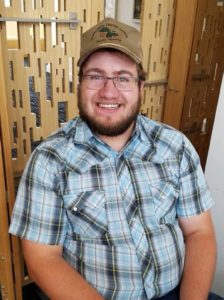
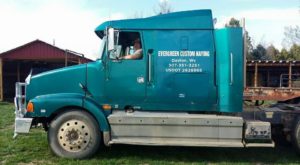
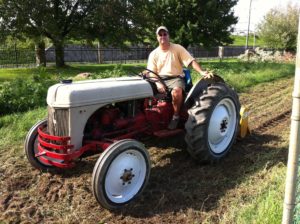

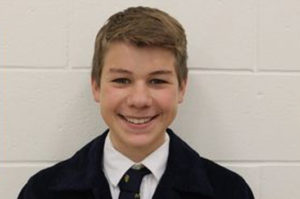
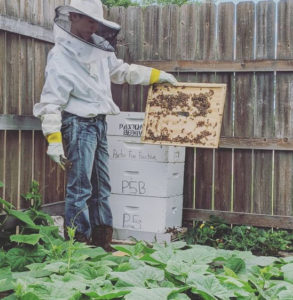
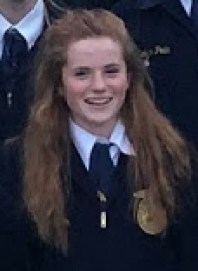
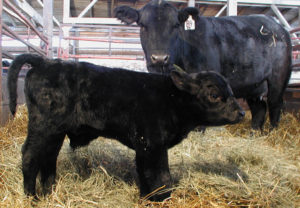
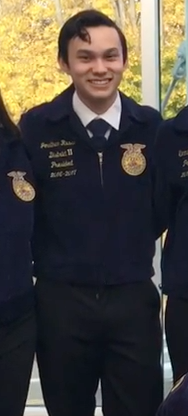
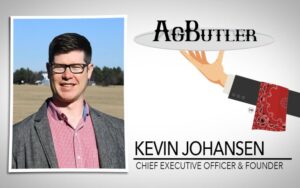
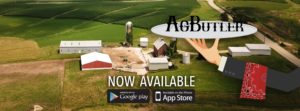
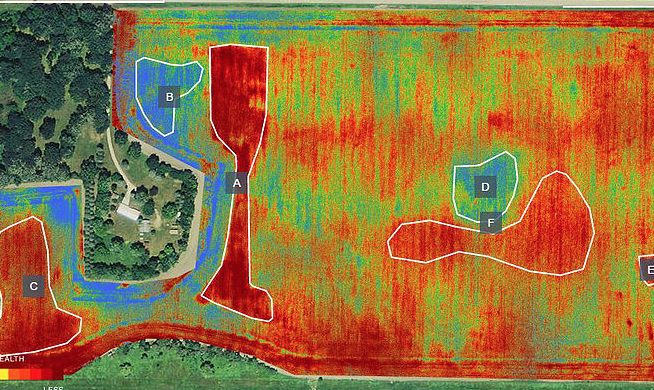
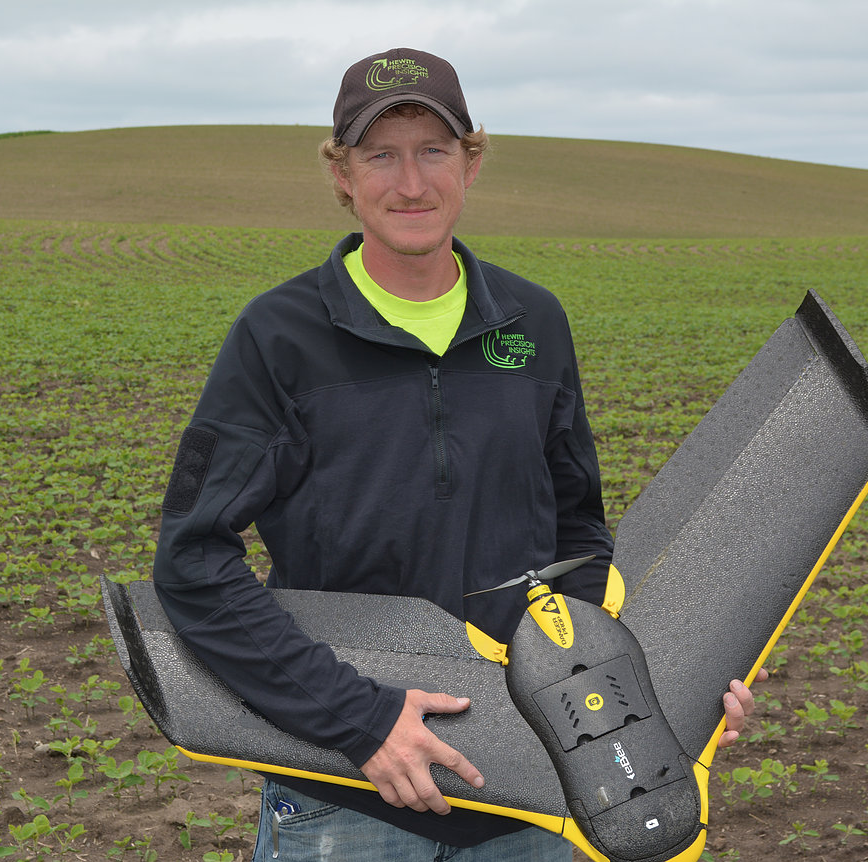
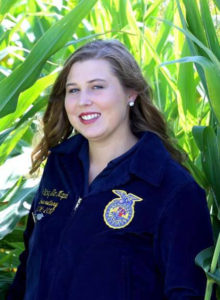
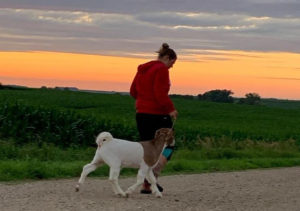 Whitney sees the industry as a key component of agriculture. Without this link in the supply chain, how would consumers receive any finished products after all? She sees her future position in the industry as vital to agriculture and to the world's food supply. She also sees this as a great way to advocate for agriculture.
Whitney sees the industry as a key component of agriculture. Without this link in the supply chain, how would consumers receive any finished products after all? She sees her future position in the industry as vital to agriculture and to the world's food supply. She also sees this as a great way to advocate for agriculture.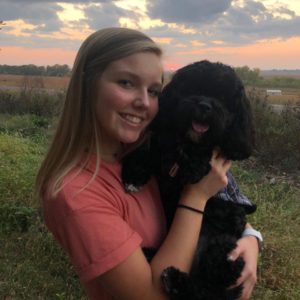
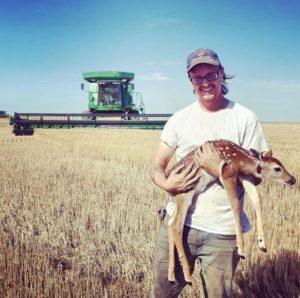
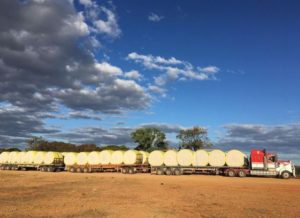
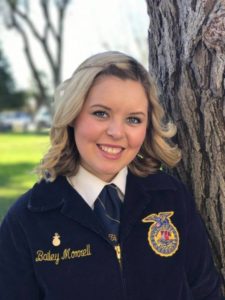
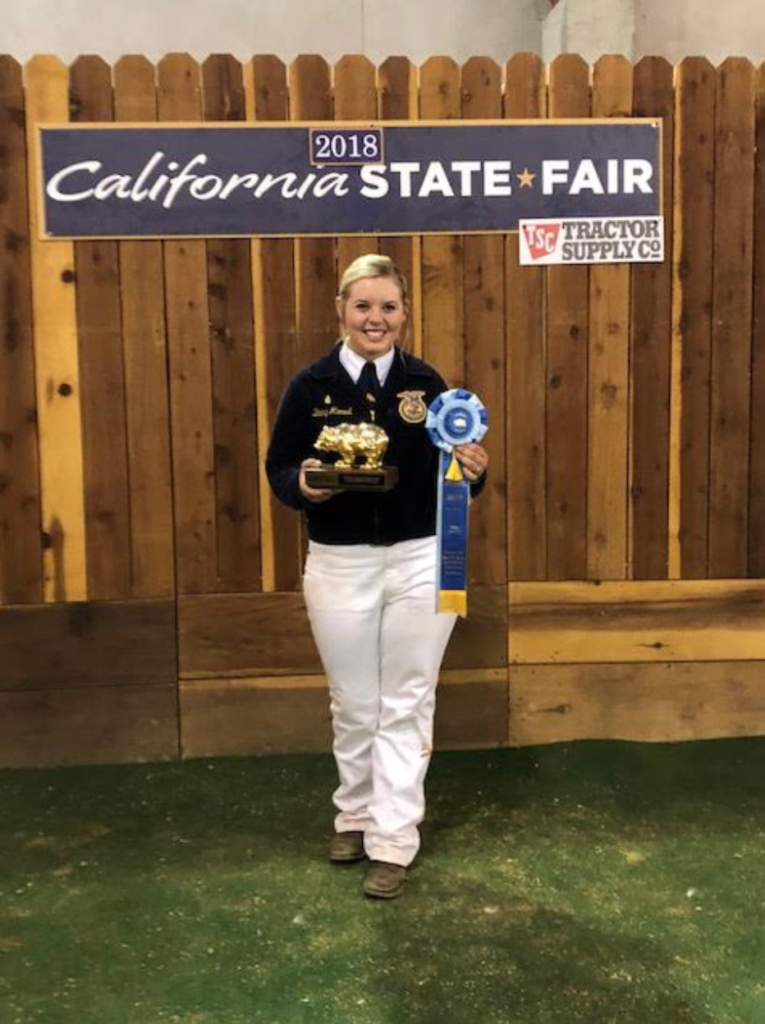 tion to be able to market her oats to a niche market
tion to be able to market her oats to a niche market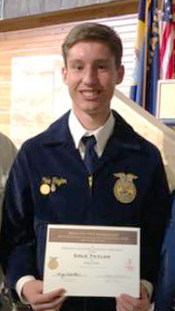
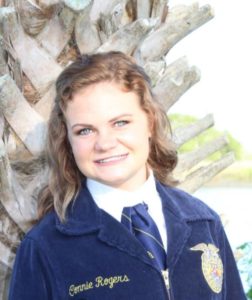
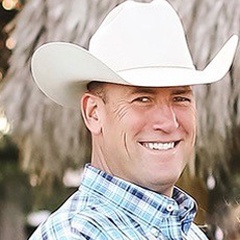
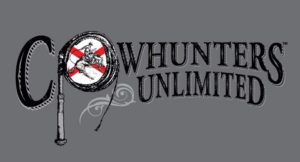
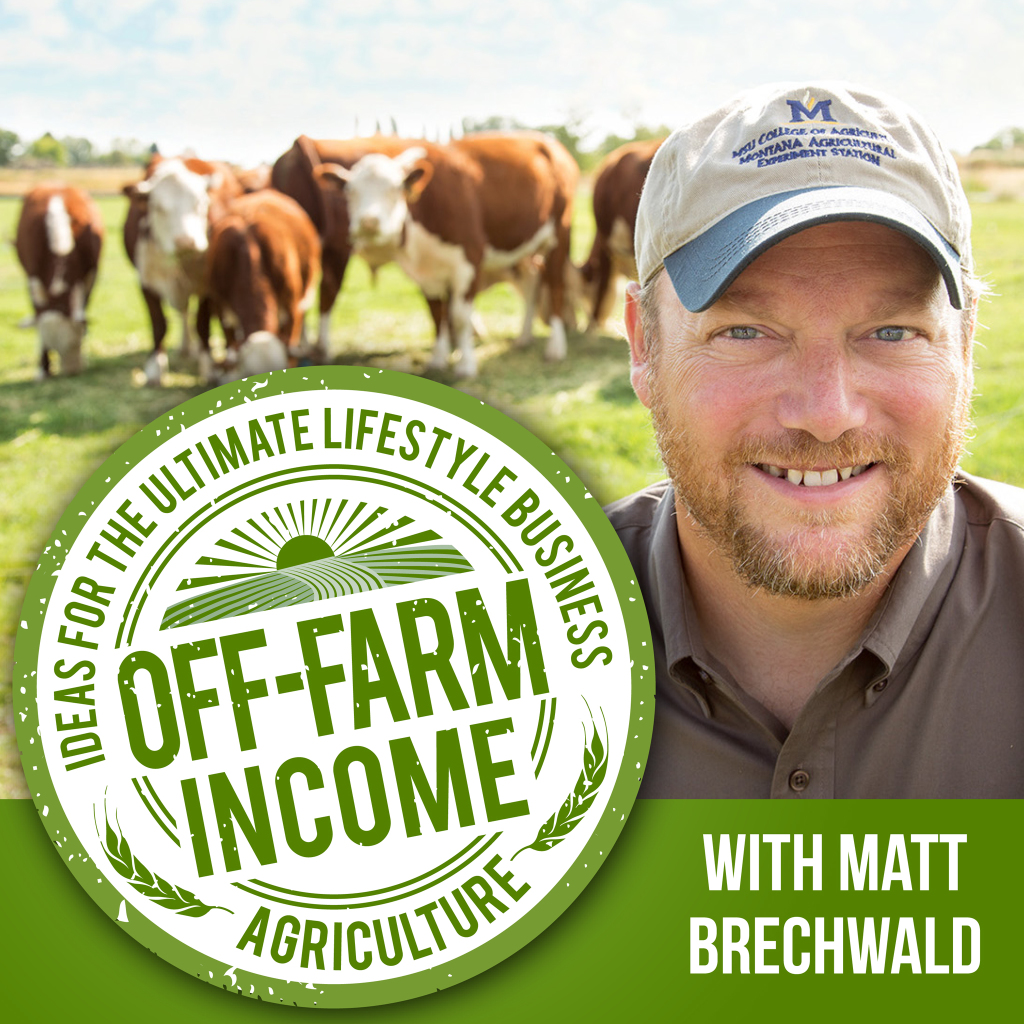
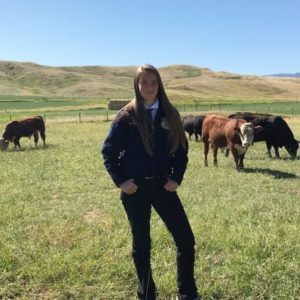
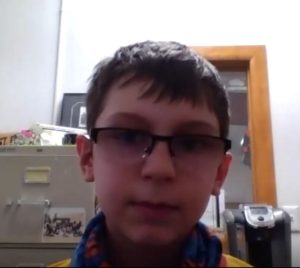
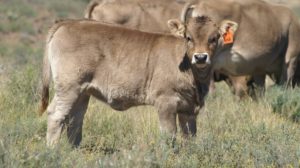 Four years from now, when I interview Wyatt again, it will be obvious how much he has grown. And, we will be able to look back on this interview and see the before and after pictures of a high achieving FFA student.
Four years from now, when I interview Wyatt again, it will be obvious how much he has grown. And, we will be able to look back on this interview and see the before and after pictures of a high achieving FFA student.